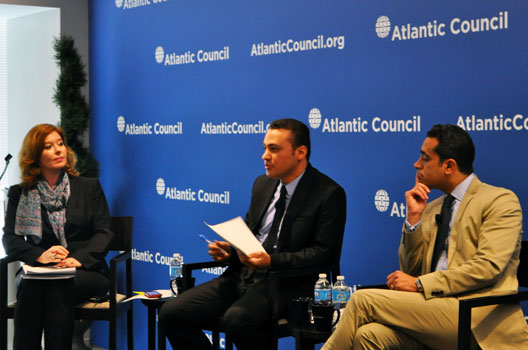 After the ouster of then-president Mohammed Morsi in July 2013, General Abdel Fattah al-Sisi has emerged as an Egyptian hero, icon, and likely the Egyptian Republic’s fifth president. His opponent in the presidential elections due to take place May 26 and 27, Nasserist Hamdeen Sabbahi, is waging an uphill battle. The Atlantic Council’s Rafik Hariri Center for the Middle East recently held a discussion on the elections and the expectations for al-Sisi’s presidency.
After the ouster of then-president Mohammed Morsi in July 2013, General Abdel Fattah al-Sisi has emerged as an Egyptian hero, icon, and likely the Egyptian Republic’s fifth president. His opponent in the presidential elections due to take place May 26 and 27, Nasserist Hamdeen Sabbahi, is waging an uphill battle. The Atlantic Council’s Rafik Hariri Center for the Middle East recently held a discussion on the elections and the expectations for al-Sisi’s presidency.
Moderated by senior fellow Amy Hawthorne, the panel included H.A. Hellyer, nonresident fellow at The Brookings Institution, Yussef Auf, an Egyptian judge and nonresident fellow at the Atlantic Council, and Michael Hanna, senior fellow at The Century Foundation. They discussed Sisi’s popularity among the Egyptian public, his support within the government bureaucracy, the legal and procedural framework for the election, and prospects for change after the election.
Hellyer described Egyptian public opinion as leaning strongly in favor of al-Sisi and the military, citing fear and insecurity as drivers for a populace that largely desires stability. In the video below, he remarked that the former Mubarak regime’s politicians might emerge as critics of Sisi, whereas Sabbahi’s ability to garner even 10 to 30 percent of the vote could lay the foundation for a political opposition.
Auf, speaking in his personal capacity and not representing any institution in Egypt, described the difference between overall fairness and procedural integrity in the upcoming vote, noting that the latter has improved. In Auf’s opinion, one should be able to bring a challenge against the commission prior to the announcement of the official results, but not after that point, in order to avoid endless lawsuits that would undermine political stability.
Hanna expressed pessimism about the prospects for significant change after the election. He does not expect to see a major course correction following al-Sisi’s anticipated victory, but possibly only a slight dialing back of some repressive measures. He noted that this bleak outlook is rooted in the fractured nature of the Egyptian state, which is chaotic and at present not under any one person’s full control.
